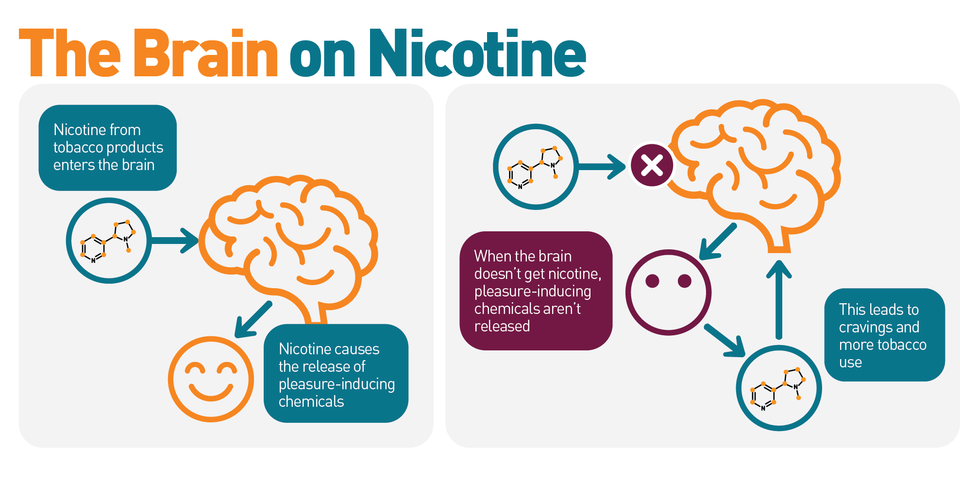When it comes to the effects of nicotine on the body, there is no denying the potential risks that it can pose to our health. But what about the effects of nicotine on our mental health? Could nicotine be causing us to experience anxiety? In this article, we’ll explore the potential association between nicotine and anxiety to better understand the effects of nicotine on our mental health.

Does Nicotine Intake Lead to Anxiety?
Nicotine is a highly addictive drug found in cigarettes, cigars, and other tobacco products. It is responsible for the pleasurable sensation that many smokers experience. However, nicotine is also linked to a number of negative physical and mental health effects, including anxiety. In this article, we will explore the relationship between nicotine and anxiety, including the potential causes, effects, and treatments.
What is Nicotine?
Nicotine is a stimulant drug found in cigarettes, cigars, and other tobacco products. It is responsible for the pleasurable sensation that many smokers experience. While nicotine can provide a temporary feeling of relaxation, it is highly addictive and can lead to serious health problems. Long-term nicotine use has been linked to an increased risk of heart disease, stroke, and cancer.
Can Nicotine Cause Anxiety?
The short answer is yes, nicotine can cause anxiety. Nicotine is a stimulant, which means it can increase alertness and energy levels. This can cause feelings of anxiety and restlessness in some people. In addition, nicotine is highly addictive. This can lead to a cycle of anxiety and nicotine use, as people use nicotine to cope with their anxiety and then become dependent on it.
What Are The Effects of Nicotine on Anxiety?
Nicotine can have both short-term and long-term effects on anxiety. In the short-term, nicotine can cause feelings of restlessness and anxiety. It can also increase heart rate and blood pressure, which can further exacerbate anxiety symptoms. In the long-term, nicotine can lead to nicotine dependence and withdrawal symptoms, which can cause further anxiety.
What Are The Treatments for Nicotine-Induced Anxiety?
The best way to treat nicotine-induced anxiety is to stop using nicotine. This can be done through quitting smoking, using nicotine replacement therapy, or seeking professional help. If quitting nicotine is not an option, there are other treatments that can help reduce anxiety. These include therapy, relaxation techniques, and medications.
How Can You Prevent Nicotine-Induced Anxiety?
The best way to prevent nicotine-induced anxiety is to avoid using nicotine. If you are already addicted to nicotine, quitting smoking or using nicotine replacement therapies can help. Additionally, avoiding triggers that can lead to nicotine cravings, such as stress and certain environments, can help. Finally, developing healthy coping skills, such as deep breathing or mindfulness, can help reduce anxiety.
Few Frequently Asked Questions
Does Nicotine Cause Anxiety?
Answer: Yes, nicotine can cause anxiety and increase the symptoms of existing anxiety disorders. Nicotine is a stimulant and triggers the release of adrenaline, which can cause feelings of anxiety and panic. Studies have shown that nicotine use can worsen the symptoms of generalized anxiety disorder, panic disorder, and social anxiety disorder.
Why Does Nicotine Cause Anxiety?
Answer: Nicotine causes anxiety because it is a stimulant. When nicotine is ingested, it triggers the release of adrenaline, which causes an increase in heart rate, breathing, and blood pressure. This can lead to feelings of anxiety, fear, and panic. Nicotine has also been linked to changes in brain chemistry, which can further contribute to anxiety.
What Are the Signs and Symptoms of Nicotine-Induced Anxiety?
Answer: The signs and symptoms of nicotine-induced anxiety can include rapid heart rate, shortness of breath, trembling, sweating, difficulty concentrating, restlessness, and feelings of panic or fear. In some cases, people may also experience nausea, headaches, and muscle tension.
How Can I Treat Nicotine-Induced Anxiety?
Answer: The best way to treat nicotine-induced anxiety is to quit smoking and get off nicotine altogether. If you are unable to quit right away, you can try to limit your nicotine intake and gradually decrease your consumption over time. Additionally, you can try lifestyle modifications such as exercise, deep breathing, and relaxation techniques to help reduce anxiety symptoms.
Are There Any Medications That Can Help Manage Nicotine-Induced Anxiety?
Answer: Yes, there are certain medications that can help manage nicotine-induced anxiety. These include antidepressants, anti-anxiety medications, and beta blockers. It is important to talk to your doctor before taking any medications to make sure they are the right option for you.
Are There Any Other Ways to Reduce Nicotine-Induced Anxiety?
Answer: In addition to medication, there are other ways to reduce nicotine-induced anxiety. Cognitive-behavioral therapy (CBT) can be used to help identify and change negative thought patterns that can contribute to anxiety. Additionally, lifestyle modifications such as exercise, healthy eating, and getting enough sleep can help reduce anxiety symptoms.
Conclusively, nicotine can cause anxiety in individuals who make use of it. Nicotine can lead to a rapid release of adrenaline and this can cause an individual to become anxious. Additionally, nicotine can lead to a decrease in the level of serotonin, which is a neurotransmitter that helps to regulate emotion. For this reason, it is important to be aware of the potential effects of nicotine before using it. It is also important to consult with a doctor if anxiety symptoms occur after using nicotine.

